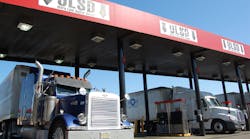Diesel and gasoline fuel prices remained on the upswing this week, according to information tracked by the Energy Information Agency (EIA), though the agency still expects fuel prices – for now at least – to moderate overall by year’s end.
The U.S. average retail pump price for diesel increased 3.9 cents to $3.876 per gallon this week, EIA reported, which is 17.2 cents higher per gallon compared to prices during the same week in 2012.
Diesel prices increased in every region of the country, exceeding the $4 per gallon mark in California ($4.065) and New England ($4.005) followed closely by the Central Atlantic ($3.939) and along the West Coast ($3.997), which witnessed the biggest week-over-week jump in diesel prices by 5.3 cents per gallon.
Gasoline prices took an even bigger jump week-over-week, EIA noted, with the U.S. average retail pump price climbing 14.7 cents to $3.639 per gallon – some 21.2 cents per gallon more expensive compared to the same week in 2012.
Prices increased across the U.S., the agency added, with the biggest spike occurring in the Midwest, (23.4 cents to $3.639 per gallon) followed by New England (up 16.7 cents to $3.735) and the Gulf Coast, which despite its 14.8 cent per gallon price spike remained home to the cheapest gasoline in the nation at $3.443 per gallon.
Yet EIA still expects fuel prices to moderate for the remainder of 2013, though the agency became more cautious about that prediction in its most recent Short Term Energy Outlook released last week.
EIA still expects that regular-grade gasoline retail prices, which averaged $3.69 per gallon during the summer of 2012, will end up averaging $3.53 per gallon between April and September this year (typically referred to as the “summer driving” season) with the projected monthly average for regular gasoline falling from $3.63 per gallon in June to $3.41 per gallon by September.
Diesel fuel prices, which averaged $3.95 per gallon last summer, are projected to average $3.84 per gallon this summer, EIA noted.
The agency is still holding fast to its prediction that that the Brent crude oil spot price will average $102 per barrel over the second half of 2013 and then $100 per barrel in 2014 – a forecast assuming no disruptions to energy markets arising from the recent unrest in Egypt.
That projection is based on the wild swing oil underwent earlier this year when after increasing to $119 per barrel in early February, the Brent crude oil spot price fell to a low of $97 per barrel in mid-April before recovering to an average of $103 per barrel in May and June – or about the same as its average over the same two-month period last year.
Furthermore, EIA noted that the discount of West Texas Intermediate (WTI) crude oil to Brent crude oil, which averaged $18 per barrel in 2012 and increased to a monthly average of more than $20 per barrel in February 2013, fell to less than $5 per barrel in early July 2013. The agency still expects the WTI discount to widen to $8 per barrel by the end of 2013 as crude oil production in Alberta, Canada, recovers following the heavy June flooding and as Midcontinent production continues to grow.



